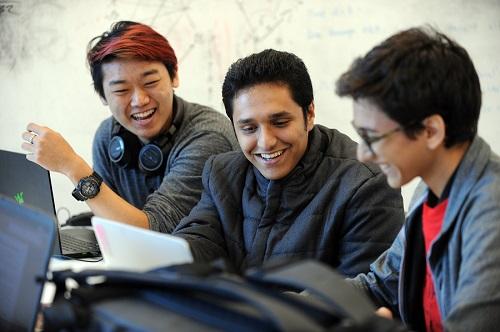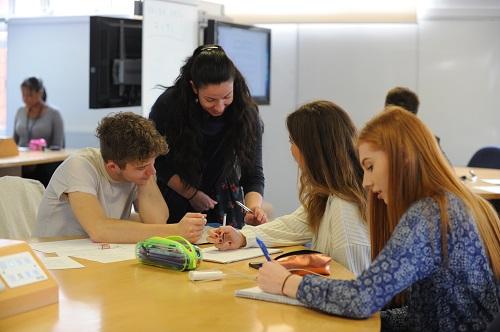Six big ideas
Six big ideas to help you succeed in your Mathematics degree.

1. The ‘Myth of Talent’ versus Time on Task
You often hear people say they “have a talent for words but just can’t do maths” or the other way round. This is the myth of talent: the idea that you have a fixed ability in an area that determines how good you can or will be at it. It is a destructive belief; studies have shown that learners with this belief do less well than those who believe that they can become good at things by working at them.
Not only is the myth of talent destructive, it is also wrong. In a whole range of different areas it has been established that the main difference between exceptional people and the less accomplished is the amount of work they put into practice. It may be that some sort of initial talent gets you off to a start with learning, but in the longer run the important thing is “time on task”.
You may be thinking that it certainly seems to you that other students are more or less talented at maths than you are. But the difference is probably down to practice again because the more you learn, the more fluent you become and the quicker it then is to learn new material: you can incorporate already understood material into your reasoning with less effort. A commonly heard claim is that to become truly exceptional at something- be it academic, musical, sporting or anything else- it takes 10,000 hours of “deliberate practice”. So the more effort you put in, the better you get, and the faster you progress.
2. Learning is not easy
It’s easy to get frustrated when it’s hard to understand something. We all expect that learning a physical skill, such as tightrope walking, requires a great deal of repetition and practice. But what can be hard about learning a few lines of mathematics - a few sentences with a few formulae? It is important to realise that all mathematicians, including fellow students and all your lecturers, spend half their time being stuck on a calculation or trying to understand a colleague’s work. So learning is not easy, and learning maths is certainly not.
When you think about it, it is easy to see why. Learning something new involves manufacturing new connections in your brain, it has to be connected to a whole load of things you know already so that it makes sense and comes to mind at useful moments.
Being stuck is good! Think of it as an opportunity to learn something. If you aren’t getting stuck quite a lot then you aren’t really pushing your limits enough.
3. Surface Learning versus Deep Learning
Knowing is not a “yes or no” thing, there are levels of understanding from simply being able to recall a fact toward deep understanding.
Surface learning results from activities such as memorising facts and formulae without worrying where they come from, or copying the solution to a problem without trying it yourself. One trouble with surface learning is that what you learn is very quickly forgotten.
Deep learning is the hard work of understanding where formulae come from and connecting new information with your existing understanding. Deep learning provides a much better base for further study.

4. Engagement is Important
Engagement is one of the things that research shows leads to success at University. This idea covers a range of things:
- Participating in lectures and workshops. Studies of first year maths students showed that those who attended one more workshop than the average number, scored 4% higher in the exam. So missing three workshops overall has the potential to cost you a grade.
- Seeking out opportunities for learning. You can do well, but you need to be proactive - think, ask and talk about things you don’t understand.
- Talking to tutors, lecturers and fellow students.
- Getting organised and take advantage of all the help on offer, e.g. MathPALs.
5. Cooperative Learning
Research has established that, for most learners, working cooperatively works better than working alone. That does not mean that all your work time should be spent studying with other people but it does mean that it is a good idea to seek out other students to work with.
We like to use collaborative learning and teaching techniques, such as peer instruction. We encourage you to work together in workshops and collaborate on problems, discussing where you get stuck and comparing answers. It is a good idea to make the most of these times to work with other students and to learn together. Likewise in your own study time organising to meet others, either on campus or online, to study together, can be a valuable use of that time
6. Monitor your learning
Metacognition is the technical term we use when describing things that are “thinking about thinking”. Focus on something you do well and imagine doing a complex task in that area - do you sometimes stop for a moment, draw back, and ask yourself if it is going well? Do you ask whether you ought to be approaching it in a different way? If you do, and most people will recognise that sort of feeling, you are using “metacognitive skills”. Studies have shown that when solving typical undergraduate maths problems, experts spend more time planning their approach, and pause more often to review how their solution is progressing, than students do. This is remarkable given that you would expect experienced lecturers might need to do these things less.
You will probably find that the type of learning we are asking for is different from what was asked of you at School. Be alert for that difference and to picking up ideas on how to change your mode of study to adapt to these new challenges.

